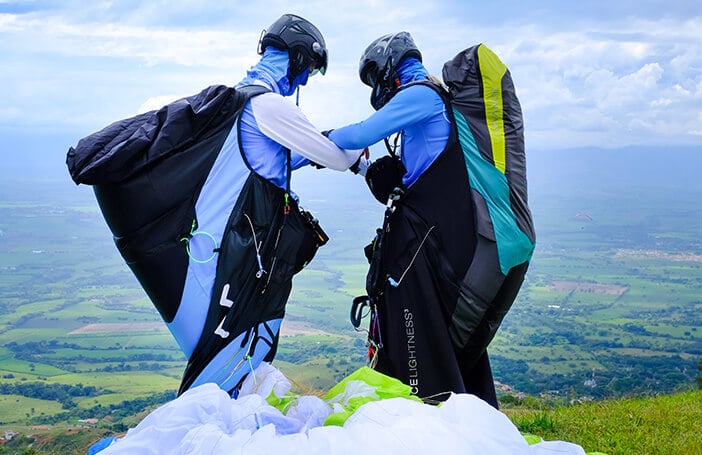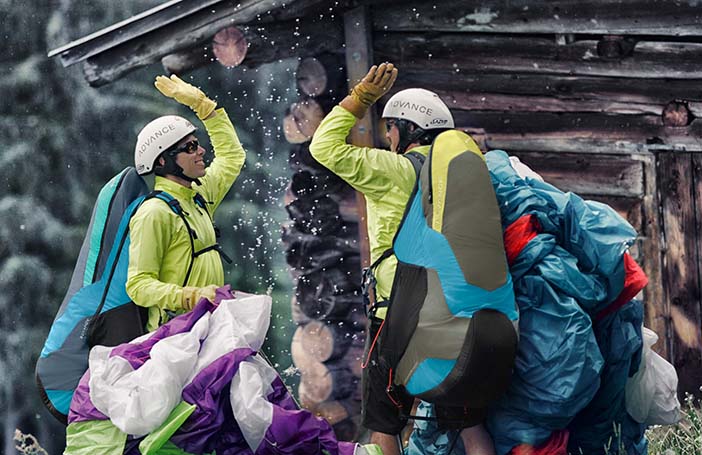Technical data
| Size | 22 | 24 | 26 | 28 |
|---|
| Flat area (m2) |
22.43 |
24.42 |
26.5 |
28.66 |
|---|
| Flat span (m) |
10.64 |
11.11 |
11.57 |
12.03 |
|---|
| Flat aspect ratio |
5.05 |
5.05 |
5.05 |
5.05 |
|---|
| Projected area (m2) |
19.29 |
21.00 |
22.79 |
24.65 |
|---|
| Projected span (m) |
8.46 |
8.83 |
9.20 |
9.57 |
|---|
| Projected aspect ratio |
3.72 |
3.72 |
3.72 |
3.72 |
|---|
| Chord (m) |
2.66 |
2.78 |
2.90 |
3.01 |
|---|
| Number of cells |
47 |
47 |
47 |
47 |
|---|
| Glider weight (kg) |
4.4 |
4.6 |
4.8 |
5.0 |
|---|
| Weight range (kg) |
65-85 |
75-95 |
85-105 |
95-115 |
|---|
| Extended weight (kg) |
- |
100 |
110 |
120 |
|---|
| Certification |
EN B |
EN B |
EN B |
EN B |
|---|
| Certified weight range (paramotor) (kg) |
85-110 |
95-120 |
105-135 |
115-150 |
|---|
| Extended weight (paramotor) (kg) |
120 |
130 |
145 |
160 |
|---|
| Certification (paramotor) (kg) |
DGAC |
DGAC |
DGAC |
DGAC |
|---|
Size guide

Colours
Standard colours: Orange, Green.
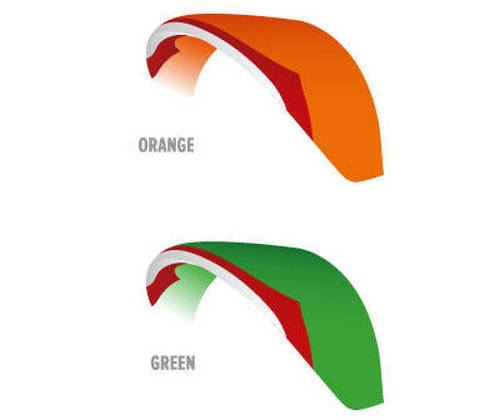
Package
Inner bag, compression strap, stickers, repair kit.
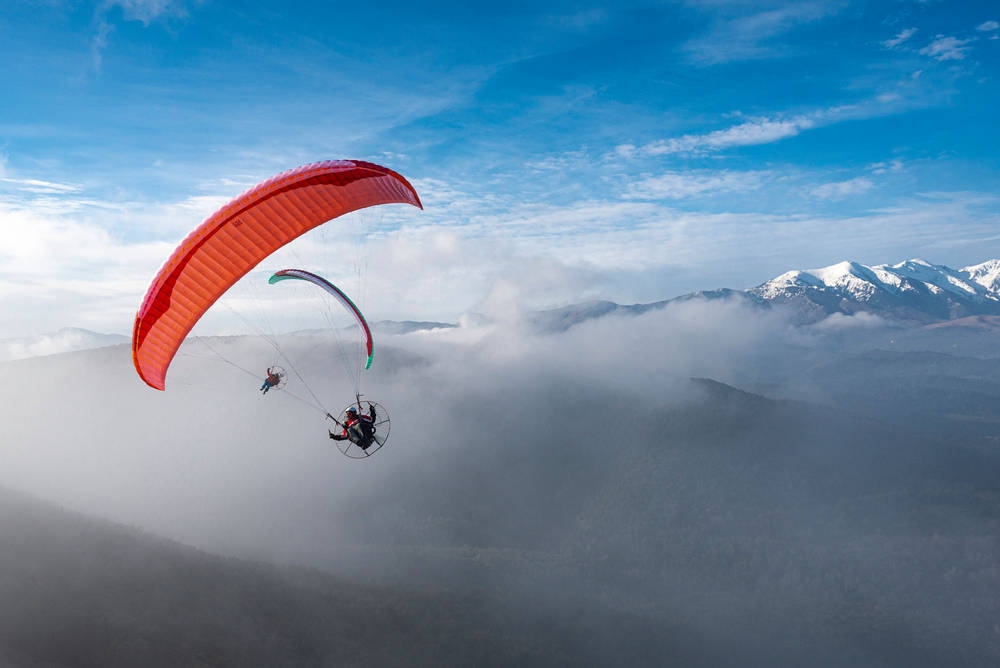
Gin Vantage 3: lightweight meets paramotor
The Vantage 3 offers several advantages over a conventional paramotor wing:
- compact to pack and light to carry
- easy inflation and rapid lift-off
- intelligent mix of fabric for lightness and durability
- easy thermalling in free flight mode
- ideal for travelling, bivouac and light trike use
The Vantage 3 can also be used as a confidence-inspiring wing for free flying, taking paramotor pilots from their first steps without a motor on to thermalling and even XC.
![]() True lightweight pedigree
True lightweight pedigree
The Vantage 3 was designed from the ground up as a lightweight paramotor wing. The handling is agile and fun, and the torque effect is reduced. It’s ideal for bivouac flying or just simply saving a bit of weight and space in your vehicle.
Light yet durable construction
The Vantage 3 achieves both lightness and durability by the intelligent mix of fabric in different locations of the canopy. The same hard-wearing fabric as normal paramotor gliders is used in wear-sensitive locations of the canopy, and lighter but still durable fabric is used in less critical areas such as the under surface.
The Vantage 3 also uses an increased number of upper lines for greater stability, yet the total line consumption is minimised thanks to careful optimisation of the line layout. The 3 risers and 2 span wise main lines offer both simplicity and performance.
Easy to inflate, fast to lift off
As a light wing, the Vantage 3 is simple to inflate even in less than ideal conditions. It requires only the gentlest pull yet comes up smoothly to a stable overhead position. What’s more, the aerodynamic characteristics of the profile result in the wing becoming airborne very quickly, ideal for short take-off runs.
![]()
![]() Ideal for light trikes
Ideal for light trikes
The easy inflation and take-off characteristics also make the Vantage 3 ideal for light trike use. The wing has a natural tendency to stabilise in the centre.![]()
![]()
User-friendly speed system
The Vantage 3 speed system is highly versatile, user-friendly and safe. 40% of the speed increase is provided by the trimmers, 60% by the speed bar. At the same time, it’s possible to use 100% of the brake range in all flight configurations (trim, open trimmers, accelerated).![]()
![]()
Designer notes
Test pilot Laurent Salinas explains the philosophy of the Vantage 3:
“Our target with Matt Minyard was to bring the advantages of lightweight paragliding wings to beginner and intermediate paramotor pilots, especially pilots looking to practice paragliding and paramotoring with the same wing.
We felt it was important to make a wing with easy inflation and take-off. This helps a lot for light trike use and the lighter canopy is also ideal for bivouac flying.
We also worked a lot to achieve the right mix of security and agile, fun handling. The shorter risers help a lot with this and speed increases are easy to manage. Speed increase is provided by both the trimmers (40%) and the speed bar (60%) and you can use the full brake range in all flight configurations (trim, open trimmers, accelerated). We also significantly reduced the torque effect compared to the Vantage 2.
All in all, the wing put a smile on our faces and we are confident it will do the same for you!”
Details
- Second generation Equalized Pressure Technology (EPT) profile significantly improves stability across the entire speed range
- 3 line risers, 2 lines spanwise for simplicity and performance
- Easy Big Ears system
- Extended weight range (24, 26 and 28 sizes) for flying at higher wing loadings
- Combination of unsheathed and sheathed aramid and dyneema lines
- Lightweight mini-ribs on the trailing edge
Materials
Canopy cloth:
- Upper surface leading edge: Dominco 3RS 41g/m² (water repellent)
- Upper surface: Dominco HD34 (water repellent) 34g/m²
- Lower surface: Porcher Skytex (water repellent) 27g/m²
Lines:
- Upper: DSL 70 | PPSL120 | PPSL65
- Middle: PPSL 160 | 200
- Main: PPSL 275 | 350 | TGL220
Downloads
EN test reports:
DGAC test reports:
Manuals:
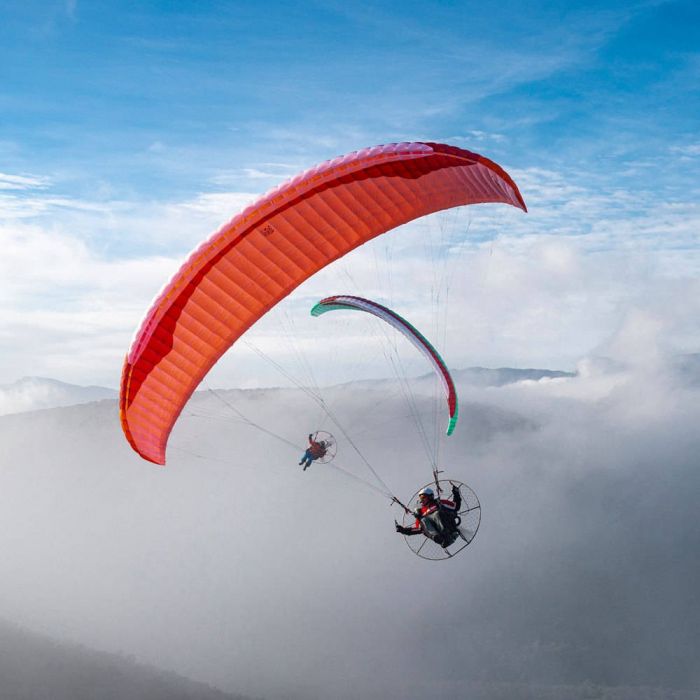
![]()






